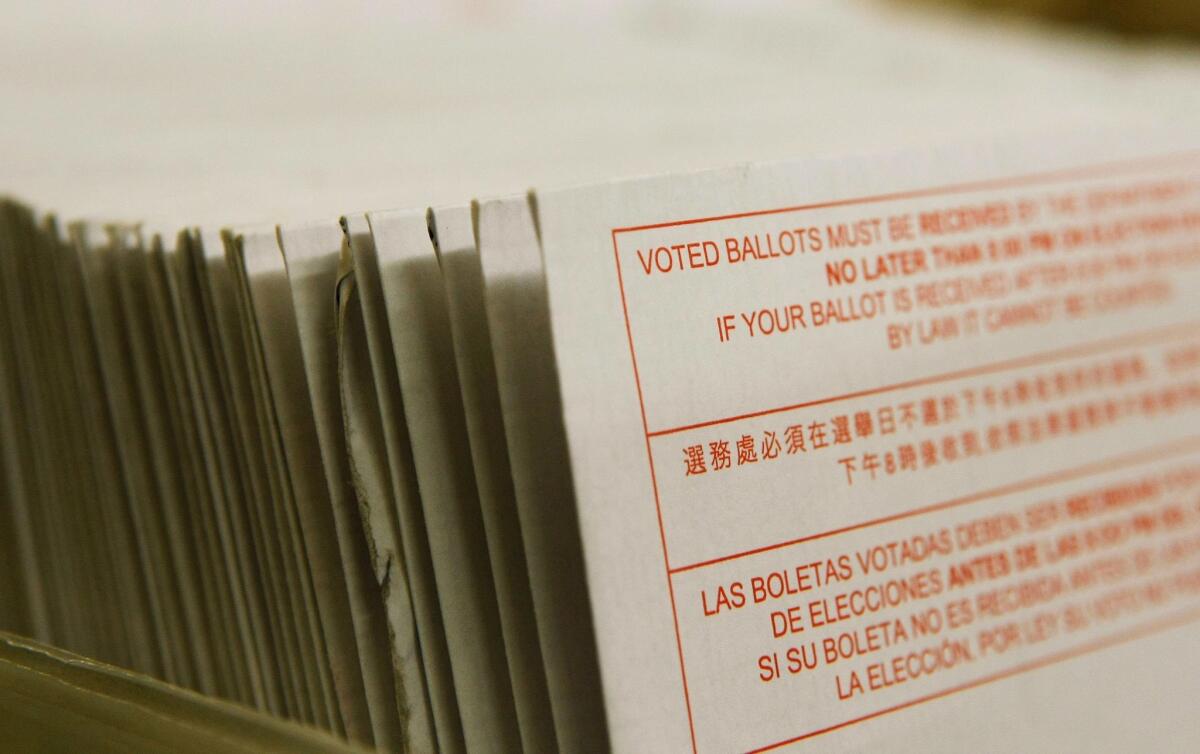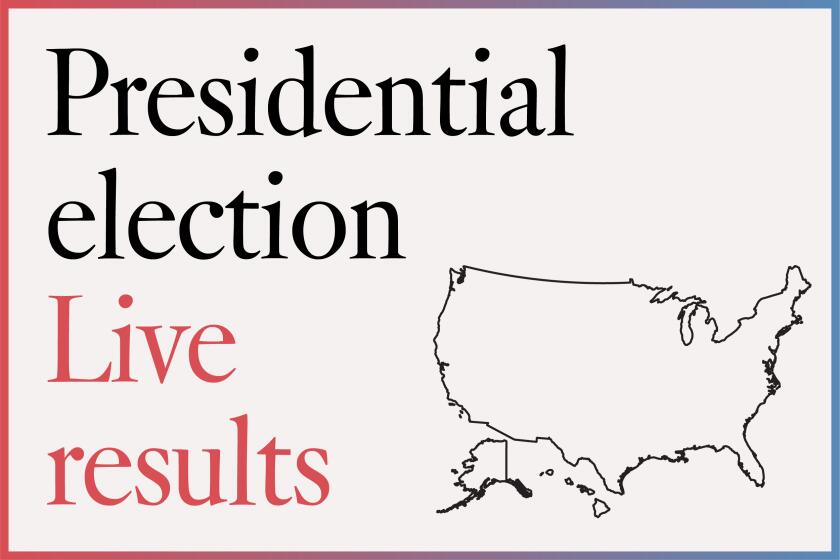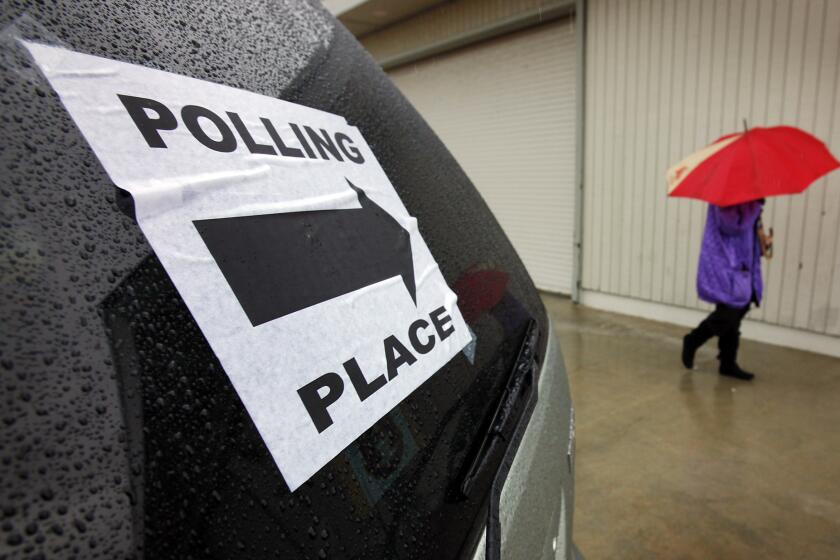Federal judge slams U.S. Postal Service and orders search for mail ballots in Texas facilities

A federal judge harshly criticized the U.S. Postal Service on Wednesday, saying the agency had failed to comply with his order to sweep postal facilities for leftover mail-in ballots in battleground states where election officials continue to count votes.
Judge Emmet G. Sullivan of Washington, D.C., also ordered postal officials to instruct mail processing facilities in Texas to conduct two searches for mail ballots Wednesday afternoon and deliver any votes to local elections offices by 5 p.m.
The Texas order comes a day after Sullivan instructed the Postal Service’s law enforcement arm to conduct a series of sweeps for mail ballots in a dozen postal facilities, including in central Pennsylvania, Philadelphia, Atlanta, Arizona and Michigan’s upper peninsula.
The Postal Service said in court filings Wednesday that it did search for ballots in all the ordered locations Tuesday, but that the 3 p.m. deadline was not “operationally possible.” The sweep eventually turned up 13 delayed mail ballots: three in a Johnstown, Pa., mail facility and 10 in Lancaster, Pa. All were referred to Postal Service management for expedited delivery, the agency said.
“I’m not pleased about this eleventh hour development last night,” Sullivan said in a hearing Wednesday. “Someone might have a price to pay for that.”
The Wednesday hearing took place as election workers continued to count thousands of mail-in ballots in Pennsylvania, Michigan and Georgia, where the outcome between former Vice President Joe Biden and President Trump remains unclear.
Sullivan’s latest order focused on Texas because Postal Service data show that mail facilities have struggled to process ballots on time. The state will only count ballots that are postmarked by election day and arrive by 5 p.m. Wednesday. It’s not likely that any new findings would affect the electoral outcome in the state, where Trump is leading by more than 700,000 votes.
Indeed, only 815 mail-in ballots were found during two sweeps of facilities in Texas that were ordered by the court on Wednesday. Nearly all the ballots were delivered directly to boards of election by the 5 p.m. deadline, with a few ballots delayed due to travel time.
Attorneys for the plaintiffs suing the Postal Service are pushing for the judge to consider additional orders that would mandate sweeps in postal facilities in central Pennsylvania, Philadelphia, Greensboro, N.C., and the mid-Carolinas district, which includes Charlotte and surrounding areas. The orders would direct ballots in those facilities that were postmarked by election day to be promptly delivered to election boards. In Pennsylvania, the deadline for those ballots is Friday, and in North Carolina, the cutoff is Nov. 12.
In an explanation of ballot delivery procedures, the Postal Service’s top executive for election mail said Wednesday in a court filing that sweeps in the afternoon, as Sullivan ordered, would not yield many ballots. That’s because processing facilities are typically busiest between 4 and 11 p.m., as mail is returned from carrier routes and local post offices, according to the the executive, Kevin Bray.
The fate of the presidency still hangs in the balance as President Trump and Joe Biden duel over a few remaining battleground states.
Sullivan also said that the postmaster general, Louis DeJoy, should also have to explain his agency’s failures to make meaningful changes within the agency after an injunction in early October aimed at boosting mail delivery speeds.
“The postmaster [general] is either going to have to be deposed or appear before me and testify under oath about why some measures were not taken after the court issued its injunction,” Sullivan said.
The Postal Service said in court filings earlier this week that nearly 300,000 ballots had been scanned into the U.S. mail system since Oct. 24 but had not been scanned again to show they had been delivered, including more than 11,000 in Pennsylvania, nearly 16,000 in Florida and more than 6,000 in Michigan.
The data raised alarm among voting rights groups that some mail ballots could be delivered too late to be counted.
Postal Service officials said that a missing destination scan does not automatically mean that a ballot was not delivered. They said workers were pulling ballots from the automated processing system and delivering them directly to elections officials, while other mail is sorted by hand because of physical flaws like smudged barcodes.
Election experts quickly corrected the president over his fraud claims, and some Republicans noted that counting all voters’ ballots was the norm.
For example, Bray said, a processing plant in North Texas has an agreement with most of the state’s elections officials to set aside ballots and deliver them directly to clerks without a delivery scan.
Bray also said that some stray ballots were found in the system because people mistakenly placed mail ballots in local ballot drop boxes — not postal collection boxes — even though the ballots were destined for out-of-state election boards. Those ballots were recovered and later delivered by the Postal Service.
“The assumption that there are unaccounted ballots within the Postal Service network is inaccurate,” spokesman David Partenheimer said in an email. He said the agency used “extraordinary measures” to expedite ballots and deliver them directly to local boards of elections.
Ballots circumventing the automated processing system, and not receiving a destination scan, was by design, Partenheimer said.
The order is part of one of several lawsuits against the Postal Service over cost-cutting measures that slowed mail delivery this year amid concerns that mail-in ballots would not be delivered on time.
The Postal Service raised concerns about complying with the judge’s order, saying that it didn’t have enough inspectors to finish the sweep in the required time.
Nationally, on-time processing for mail ballots heading back to elections officials rose from 89.59% Monday to 93.25% on election day, the Postal Service said. Performance was lower in some regions, including the Great Lakes distribution area, which includes the battleground states of Michigan and Wisconsin. There, just 78.8% of ballots were processed on time Tuesday, the agency said.
In the Atlanta area, 82.17% of ballots heading back to election officials were processed on time Tuesday, the agency said. Georgia does not count mail ballots that arrive after the polls close on election day.
More to Read
Get the L.A. Times Politics newsletter
Deeply reported insights into legislation, politics and policy from Sacramento, Washington and beyond. In your inbox three times per week.
You may occasionally receive promotional content from the Los Angeles Times.














